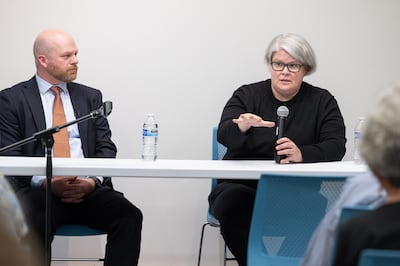Multnomah County commissioners were less than dazzled by the performance of the county’s drug deflection center during its first year of operation, which ended Aug. 31.
At a briefing Thursday, commissioners bemoaned the center’s cost, its inability to send people directly into treatment, and missed opportunities to get people into housing.
Of the people who visited the Coordinated Care Pathway Center—the official name for the deflection center—81% were living in a tent, staying with friends or family, living in a car or RV, or staying in a homeless shelter, the county said in the center’s annual report.
“To me, this is an opportunity to leverage services,” Commissioner Shannon Singleton said. “The shelter component is low-hanging fruit.”
Oregon counties were encouraged by the Legislature to start deflection programs to keep people arrested for drug possession out of jail after lawmakers overturned 2020’s Measure 110 and recriminalized the personal use of illegal drugs.
Multnomah County elected to open the the Pathway Center as a place for police to bring people they pick up on drug charges. During its first year of operations, officers brought violators to the center 606 times, the county said. Not counting repeat visitors, the center served 520 people. Using either figure, the number of visits works out to fewer than two a day for the year.
A total of 113 people who entered the center completed deflection. Completion is defined as seeking peer support, shelter, medical help, sobering services, detox, treatment for substance use disorder, mental health treatment or “insurance/basic needs.”
House Bill 4002, which created deflection in 2024, provided state money to counties and gave them leeway to design programs that best addressed local needs. Counties may determine eligibility, select services, and define what successful deflection looks like.

“I’m concerned that this model doesn’t fundamentally work and that cost per person is extremely high,” Commissioner Meghan Moyer said during the briefing. “We’re spending significant taxpayer dollars without being able make more than an anecdotal case that we have changed the direction of someone’s life.”
Anthony Jordan, interim director of the Multnomah County Health Department’s behavioral health division, called the inquiries “really big questions” and said the Pathway Center was being judged on things it wasn’t designed to do.
“What people are asking for is a new design,” Jordan said.
In its design phase last year, commissioners debated whether the Pathway Center should do more than just deflect people from jail. Commissioner Julia Brim-Edwards pushed hard for a place where people could sober up or come down off drugs. The temporary Pathway Center, located in inner Southeast Portland, has a 13-bed sobering unit.
In June, the center began accepting people for sobering from organizations beyond law enforcement, including Portland Street Response, Project Respond, Community Health Assess and Treat, Mental Health and Addiction Association of Oregon, and 4D Recovery.
Like Moyer, Brim-Edwards, too, was outraged about the cost per person.
“Two people a day for the millions we’ve spent can’t continue,” Brim-Edwards said. “I think we need an improved model.”
The county used $3.8 million from a $25 million state grant to turn an old print warehouse on Southeast Sandy Boulevard into the Pathway Center. The state provided another $4.3 million to operate the center for the year ended Aug. 31. The bulk of the $25 million grant will be used to build a permanent Pathway Center, set to open in 2027.
Former County Commissioner Sharon Meieran, a medical doctor and longtime critic of the county’s mental health efforts, called the Pathway Center’s first year a failure.
“There’s only one thing that matters in deflection: getting people who are addicted to drugs through treatment and into long-term recovery,” Meieran said in a message to WW. “And for that, the county doesn’t have a single data point. They are literally counting everything except the only thing.”
Meieran, who was on the board of commissioners when it created the Pathway Center, said the total cost to run it for one year, including construction, was $15 million.
Brim-Edwards said outcomes could be improved if commissioners and the public could attend meetings where management of the center is discussed.
Among the commissioners, only Chair Jessica Vega Pederson attends those meetings, along with city officials and law enforcement leaders. The attendees, Vega Pederson said, are set by state statute.
“Doing it behind closed doors is a disservice to the county,” Brim-Edwards said.
Vega Pederson held firm, calling for Brim-Edwards to stop interrupting her and vowing to continue deflection meetings without county commissioners or the public.
“That is the way we will continue to operate so we can continue to have frank discussions,” Vega Pederson said.
(Correction: An earlier version of this story said that Oregon legislators “compelled” counties to start deflection programs. Legislators “encouraged” them to do so. WW regrets the error.)
